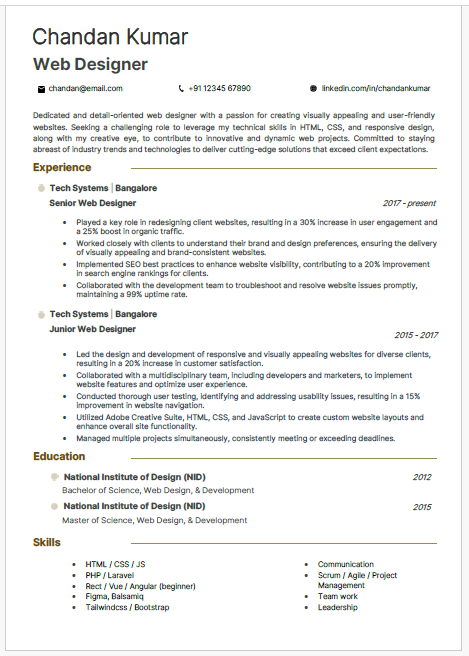Senior Web Designer
Master of Science, Web Design, & Development

About this template
This resume is made by MS Word, featuring a clean and modern layout designed to highlight your skills and achievements
This is a very professional resume which can significantly enhance your job prospects. With its clean, modern design and industry-tailored layout, it highlights your skills and achievements, making a strong impression on recruiters.
Some Useful and Important Technical Skills for Website Designer
Website designers need a combination of technical skills to create visually appealing, user-friendly, and functional websites. Here are ten important technical skills for a website designer :
1. HTML/CSS
Mastery of HTML and CSS is fundamental for structuring web pages and styling them. These languages allow designers to create responsive, accessible, and visually consistent websites.
2. JavaScript
Proficiency in JavaScript is crucial for adding interactivity and dynamic elements to websites. Knowledge of libraries and frameworks like jQuery, React, or Vue.js enhances functionality and user experience.
3. Responsive Design
Understanding responsive design principles ensures that websites adapt seamlessly to different screen sizes and devices, providing a consistent user experience across desktops, tablets, and smartphones.
4. Graphic Design Software
Skills in graphic design software such as Adobe Photoshop, Illustrator, and XD or Figma are essential for creating and editing visual elements, mockups, and prototypes of web pages.
5. User Experience (UX) Design
Knowledge of UX design principles helps designers create intuitive and user-centered interfaces. This involves conducting user research, creating personas, and developing wireframes and prototypes to enhance usability.
6. User Interface (UI) Design
UI design skills focus on the visual aspects of a website, including layout, color schemes, typography, and overall aesthetics. A strong UI design ensures a visually pleasing and cohesive look and feel.
7. Content Management Systems (CMS)
Familiarity with CMS platforms like WordPress, Joomla, or Drupal allows designers to create and manage website content efficiently, leveraging themes and plugins to extend functionality.
8. SEO Best Practices
Understanding SEO principles ensures that websites are optimized for search engines, improving visibility and ranking. This includes using proper tags, meta descriptions, and ensuring fast load times.
9. Web Performance Optimization
Skills in optimizing website performance, such as image compression, code minification, and leveraging browser caching, help ensure fast load times and a smooth user experience.
10. Version Control/Git
Proficiency in version control systems like Git enables designers to manage code changes, collaborate with developers, and maintain a history of project revisions, ensuring a streamlined workflow.
Conclusion :
These technical skills equip website designers with the necessary tools to create engaging, functional, and accessible websites that meet modern web design standards and client requirements effectively.